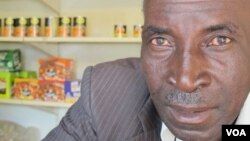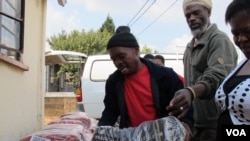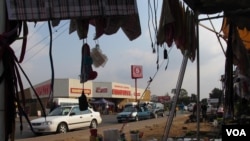SOWETO —
Informal sectors make up a significant portion of South Africa's economy and are critical for creating jobs in a country with a chronic unemployment rate of at least 25 percent. But an influx of immigrant merchants and international retailers and their growing dominance in the market has been a headache for local traders in South Africa running informal shops - known as spazas.
John Stheole has owned his spaza shop - the informal stores that dot the corners of townships - for more than a decade. His shop is in a small grey single-story building, tucked away in Dube village, in Soweto - a sprawling urban area in Johannesburg and once a township flashpoint during the apartheid struggle.
His store offers a hodgepodge of staple goods, including washing powder (laundry soap), toilet paper, maize-meal, eggs and sweet treats.
Townships were urban areas where non-whites were forced to live under apartheid and informal stores catered to the impoverished residents. Known as tuck-shops or spazas - a slang word that denotes "just getting by" - they became a feature of the township landscape, as formal shopping places were either too difficult to access or too expensive.
There are approximately 100,000 such stores in South Africa - employing around 290,000 people.
Little attention has been paid to the role of the informal sector in fostering growth and creating jobs. In fact, the informal sector contributes about 55% percent of Sub-Saharan Africa's GDP and 80 percent of the labor force. Nine in 10 rural and urban workers have informal jobs in Africa and most employees are women and youth, according to the African Development Bank. In South Africa alone, there are around 750,000 informal traders, including spaza owners.
But business has been slow for Stheole who is struggling to compete with a rival store across the road run by a family from Pakistan.
"I can tell you that as from last year, January, last year, I am struggling… I was fortunate that the Pakistani which is opposite me - he was not there - but as he came last year- I started to start down more," said Stheole.
South Africa is the only country in the region where refugees and asylum-seekers have freedom of movement and the right to work. People have been forced to flee their homes in places like Somalia, Zimbabwe and elsewhere. For them, South Africa is their only hope of living and working in peace.
Diminishing profits for indigenous traders and chronic unemployment rates in South Africa have sparked tension with immigrants who are perceived to be taking jobs and putting South African shopkeepers out of business by undercutting their prices. For example, in September, more than 100 Somali-owned spazas were looted during a four-day spree around the coastal city, Port Elizabeth.
Some analysts say that the demise of the South African spaza was predictable, as they appear to be uncompetitive. Foreign traders have succeeded in topping their local rivals by buying a better range of stock in bulk from cash-and-carry wholesalers, selling goods at competitive prices and offering discounts to capture customers from their neighboring stores.
The South Africa Spaza and Tuckshop Association (SASTA) is trying to build skills among local traders with training and coordinating sellers to buy bulk products.
"It is a very important part of the community. It's our neighbor business where you help one neighbor to be able to survive for a day," said Rose Nkosi. "In the afternoon, she knows you are nearer her house."
Rose Nkosi, president of the association, says that local spaza shops are still crucial to stimulating the local economy.
But in her neighborhood, a growing number of brick bungalows and shiny 4x4 vehicles indicate that the wallets of the township are growing fatter (people have more money). Shoprite - Africa's top retailer - has a store perched opposite a line of rickety wooden stalls selling mobile phone covers and socks. Despite the sharp rise in supermarkets in these areas, many argue the spaza is instrumental for people still living in acute poverty and can only afford a single item. A single egg might set you back 12 cents and a single cigarette costs 18 cents.
"The buying pattern or how people buy in the location is very different to how people buy in the suburbs. You buy groceries on a monthly basis; people in this location can't afford the luxury to have 1500 rand [$143] in one go to buy groceries so they buy as they need basically. So that is why the spaza shop market will never go away, because there is demand for how these people trade," said Songi Pama, the managing director of Liph-zarro Consultants. Her company works with local traders to maximize their business potential and develop innovative strategies to help them compete.
Pama says the prominence of the informal sector in most African economies stems from the opportunities it offers to the most vulnerable such as the poorest, women and youth.
For Rose Nkosi, local run spazas offer the community something neither supermarkets nor the foreign traders can offer: credit and 24-hour service.
"Now the granny will come to the spaza shop and say, 'I don't have milk can I have a sour milk? I don't have bread, sugar', the spaza shop will write and say 'ok, credit facility now'….the granny now gives to the child now the granny is safe," she said.
Local spaza traders may have to adjust to a more competitive market but in South Africa, the tuck-shop is far from closing.
John Stheole has owned his spaza shop - the informal stores that dot the corners of townships - for more than a decade. His shop is in a small grey single-story building, tucked away in Dube village, in Soweto - a sprawling urban area in Johannesburg and once a township flashpoint during the apartheid struggle.
His store offers a hodgepodge of staple goods, including washing powder (laundry soap), toilet paper, maize-meal, eggs and sweet treats.
Townships were urban areas where non-whites were forced to live under apartheid and informal stores catered to the impoverished residents. Known as tuck-shops or spazas - a slang word that denotes "just getting by" - they became a feature of the township landscape, as formal shopping places were either too difficult to access or too expensive.
There are approximately 100,000 such stores in South Africa - employing around 290,000 people.
Little attention has been paid to the role of the informal sector in fostering growth and creating jobs. In fact, the informal sector contributes about 55% percent of Sub-Saharan Africa's GDP and 80 percent of the labor force. Nine in 10 rural and urban workers have informal jobs in Africa and most employees are women and youth, according to the African Development Bank. In South Africa alone, there are around 750,000 informal traders, including spaza owners.
But business has been slow for Stheole who is struggling to compete with a rival store across the road run by a family from Pakistan.
"I can tell you that as from last year, January, last year, I am struggling… I was fortunate that the Pakistani which is opposite me - he was not there - but as he came last year- I started to start down more," said Stheole.
South Africa is the only country in the region where refugees and asylum-seekers have freedom of movement and the right to work. People have been forced to flee their homes in places like Somalia, Zimbabwe and elsewhere. For them, South Africa is their only hope of living and working in peace.
Diminishing profits for indigenous traders and chronic unemployment rates in South Africa have sparked tension with immigrants who are perceived to be taking jobs and putting South African shopkeepers out of business by undercutting their prices. For example, in September, more than 100 Somali-owned spazas were looted during a four-day spree around the coastal city, Port Elizabeth.
Some analysts say that the demise of the South African spaza was predictable, as they appear to be uncompetitive. Foreign traders have succeeded in topping their local rivals by buying a better range of stock in bulk from cash-and-carry wholesalers, selling goods at competitive prices and offering discounts to capture customers from their neighboring stores.
The South Africa Spaza and Tuckshop Association (SASTA) is trying to build skills among local traders with training and coordinating sellers to buy bulk products.
"It is a very important part of the community. It's our neighbor business where you help one neighbor to be able to survive for a day," said Rose Nkosi. "In the afternoon, she knows you are nearer her house."
Rose Nkosi, president of the association, says that local spaza shops are still crucial to stimulating the local economy.
But in her neighborhood, a growing number of brick bungalows and shiny 4x4 vehicles indicate that the wallets of the township are growing fatter (people have more money). Shoprite - Africa's top retailer - has a store perched opposite a line of rickety wooden stalls selling mobile phone covers and socks. Despite the sharp rise in supermarkets in these areas, many argue the spaza is instrumental for people still living in acute poverty and can only afford a single item. A single egg might set you back 12 cents and a single cigarette costs 18 cents.
"The buying pattern or how people buy in the location is very different to how people buy in the suburbs. You buy groceries on a monthly basis; people in this location can't afford the luxury to have 1500 rand [$143] in one go to buy groceries so they buy as they need basically. So that is why the spaza shop market will never go away, because there is demand for how these people trade," said Songi Pama, the managing director of Liph-zarro Consultants. Her company works with local traders to maximize their business potential and develop innovative strategies to help them compete.
Pama says the prominence of the informal sector in most African economies stems from the opportunities it offers to the most vulnerable such as the poorest, women and youth.
For Rose Nkosi, local run spazas offer the community something neither supermarkets nor the foreign traders can offer: credit and 24-hour service.
"Now the granny will come to the spaza shop and say, 'I don't have milk can I have a sour milk? I don't have bread, sugar', the spaza shop will write and say 'ok, credit facility now'….the granny now gives to the child now the granny is safe," she said.
Local spaza traders may have to adjust to a more competitive market but in South Africa, the tuck-shop is far from closing.






